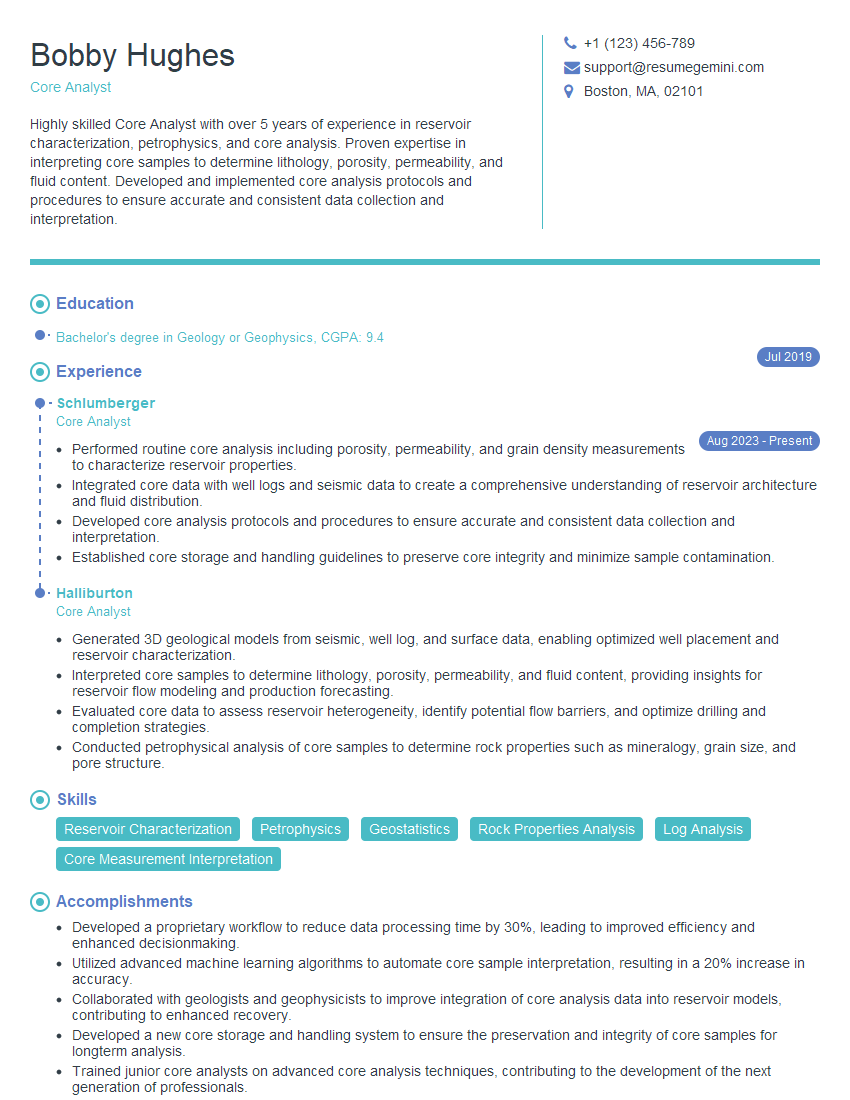Are you a seasoned Core Analyst seeking a new career path? Discover our professionally built Core Analyst Resume Template. This time-saving tool provides a solid foundation for your job search. Simply click “Edit Resume” to customize it with your unique experiences and achievements. Customize fonts and colors to match your personal style and increase your chances of landing your dream job. Explore more Resume Templates for additional options.

Bobby Hughes
Core Analyst
Summary
Highly skilled Core Analyst with over 5 years of experience in reservoir characterization, petrophysics, and core analysis. Proven expertise in interpreting core samples to determine lithology, porosity, permeability, and fluid content. Developed and implemented core analysis protocols and procedures to ensure accurate and consistent data collection and interpretation.
Education
Bachelor’s degree in Geology or Geophysics
July 2019
Skills
- Reservoir Characterization
- Petrophysics
- Geostatistics
- Rock Properties Analysis
- Log Analysis
- Core Measurement Interpretation
Work Experience
Core Analyst
- Performed routine core analysis including porosity, permeability, and grain density measurements to characterize reservoir properties.
- Integrated core data with well logs and seismic data to create a comprehensive understanding of reservoir architecture and fluid distribution.
- Developed core analysis protocols and procedures to ensure accurate and consistent data collection and interpretation.
- Established core storage and handling guidelines to preserve core integrity and minimize sample contamination.
Core Analyst
- Generated 3D geological models from seismic, well log, and surface data, enabling optimized well placement and reservoir characterization.
- Interpreted core samples to determine lithology, porosity, permeability, and fluid content, providing insights for reservoir flow modeling and production forecasting.
- Evaluated core data to assess reservoir heterogeneity, identify potential flow barriers, and optimize drilling and completion strategies.
- Conducted petrophysical analysis of core samples to determine rock properties such as mineralogy, grain size, and pore structure.
Accomplishments
- Developed a proprietary workflow to reduce data processing time by 30%, leading to improved efficiency and enhanced decisionmaking.
- Utilized advanced machine learning algorithms to automate core sample interpretation, resulting in a 20% increase in accuracy.
- Collaborated with geologists and geophysicists to improve integration of core analysis data into reservoir models, contributing to enhanced recovery.
- Developed a new core storage and handling system to ensure the preservation and integrity of core samples for longterm analysis.
- Trained junior core analysts on advanced core analysis techniques, contributing to the development of the next generation of professionals.
Awards
- Received Core Analyst Excellence Award for innovative techniques in reservoir characterization.
- Recognized forExceptional Contribution to Core Analysis by Society of Petroleum Engineers (SPE).
- Won first place in the Core Analysis Poster Competition at the International Core Analysis Symposium.
- Received Honorable Mention for Best Paper Presentation on Core Analysis at the AAPG Annual Meeting.
Certificates
- Certified Petroleum Data Analyst (CPDA)
- Certified Petroleum Geologist (CPG)
- Core Analysis Technician (CAT)
- Reservoir Engineering Certification (REC)
Career Expert Tips:
- Select the ideal resume template to showcase your professional experience effectively.
- Master the art of resume writing to highlight your unique qualifications and achievements.
- Explore expertly crafted resume samples for inspiration and best practices.
- Build your best resume for free this new year with ResumeGemini. Enjoy exclusive discounts on ATS optimized resume templates.
How To Write Resume For Core Analyst
- Quantify your accomplishments with specific metrics and results whenever possible.
- Highlight your expertise in reservoir characterization, petrophysics, and core analysis.
- Showcase your ability to integrate core data with other data sources to create a comprehensive understanding of the reservoir.
- Emphasize your skills in developing and implementing core analysis protocols and procedures.
Essential Experience Highlights for a Strong Core Analyst Resume
- Generated 3D geological models from seismic, well log, and surface data, enabling optimized well placement and reservoir characterization.
- Interpreted core samples to determine lithology, porosity, permeability, and fluid content, providing insights for reservoir flow modeling and production forecasting.
- Evaluated core data to assess reservoir heterogeneity, identify potential flow barriers, and optimize drilling and completion strategies.
- Conducted petrophysical analysis of core samples to determine rock properties such as mineralogy, grain size, and pore structure.
- Performed routine core analysis including porosity, permeability, and grain density measurements to characterize reservoir properties.
- Integrated core data with well logs and seismic data to create a comprehensive understanding of reservoir architecture and fluid distribution.
- Developed and implemented core analysis protocols and procedures to ensure accurate and consistent data collection and interpretation.
Frequently Asked Questions (FAQ’s) For Core Analyst
What is the role of a Core Analyst?
A Core Analyst is responsible for characterizing the physical and chemical properties of reservoir rocks and fluids to aid in the evaluation, development, and management of hydrocarbon reservoirs.
What are the key skills required for a Core Analyst?
Key skills include reservoir characterization, petrophysics, geostatistics, rock properties analysis, log analysis, and core measurement interpretation.
What is the typical educational background for a Core Analyst?
A Bachelor’s degree in Geology or Geophysics is typically required.
What are the career prospects for a Core Analyst?
Core Analysts can advance to roles such as Reservoir Engineer, Petrophysicist, or Geologist.
What are the key challenges faced by Core Analysts?
Challenges include working with limited data, interpreting complex geological formations, and ensuring the accuracy and reliability of data.
What are the major software used by Core Analysts?
Common software includes Petrel, Techlog, and CoreLab.
What is the difference between a Core Analyst and a Petrophysicist?
Core Analysts focus specifically on the analysis of core samples, while Petrophysicists analyze a broader range of data, including well logs, seismic data, and production data.